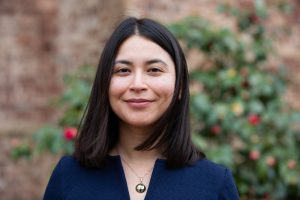Aliosha Barranco Lopez
Aliosha is a doctoral student in philosophy. She has a bachelor’s degree and a master’s degree in philosophy, both from the National Autonomous University of Mexico. She is originally from Mexico City.

What made you choose UNC-Chapel Hill when deciding on a program/place to study?
First of all, UNC has one of the best philosophy departments in the world, and I wanted to get my Ph.D. with the best. In addition to that, when I was applying to several graduate programs, the only person who was always helpful and kind resolving my questions was the student services coordinator at UNC’s philosophy department: Rebecca Farris. That made me think that UNC is more welcoming than many other places – in many programs I contacted, nobody ever answered my emails! Finally, I decided to come to UNC because of the weather! I knew that I could only aspire to be happy in a place where the weather is not too bad. Chapel Hill is that place.
Tell us about your research.
We have different beliefs, desires, fears, hopes, etc. They are different from each other, but what makes a belief a belief and not a desire or wishful thinking? This is the question that I am trying to answer.
What I argue is that beliefs are mental states that put rational constraints on us and our actions. Once you believe, let’s say, that women and men make equally important contributions within academic contexts, then you are rationally required to live up to your belief. You ought to consider an article written by a woman as good as one written by a man; you ought to be as interested in listening to a woman’s opinion on quantum mechanics as you are in listening to a man’s opinion on the same topic, etc. If you did not do any of these things, we would rightly call you irrational, or we would doubt that you actually have such a belief (maybe you would like to believe such a thing, but given your actions, we have to conclude that you do not believe it). 
Although this seems to me an intuitive and compelling way of thinking about beliefs, historically, philosophers have overlooked the connection between beliefs and actions. Instead, they have focused exclusively on how beliefs are connected to the evidence we have for them. Part of my research is to explain why the connection between beliefs and actions is essential to the nature of belief but the connection between beliefs and evidence is not essential to a belief. We can have (and often have) beliefs that cannot be supported by the evidence – like religious beliefs or our belief that there is an external world independent of our perceptions and imagination.
How have you built community as a graduate student at Carolina?
First of all, I am part of the IME [Initiative for Minority Excellence] community, which itself has a massive role in building a flourishing community of graduate students from underrepresented groups. Inspired by the work that it is done there, last semester I led a writing group in the philosophy department where graduate students at any stage in the program came to work together.
Currently, I am part of the mentoring program that the philosophy department runs to help first-year students navigate graduate school. I believe that close interactions among all graduate students are paramount in the creation of a sense of community.
What are you hoping to accomplish with your Carolina degree?
I want to become a research professor at the university level. I want to engage in philosophical research that furthers our understanding of the most fundamental questions humans have wondered about.
At the same time, I want to continue teaching philosophy to college students. Philosophy is a tool that enables people to examine their preconceptions and prejudices; one that invites us to consider our duties to others and investigate the grounds for our deeply held beliefs. Philosophy can empower students to speak up against problems of injustice and inequality and, more importantly, it equips them with some of the tools they need to develop novel solutions to the most pressing problems of our times (e.g. discrimination, climate change, mass migrations, etc.).
